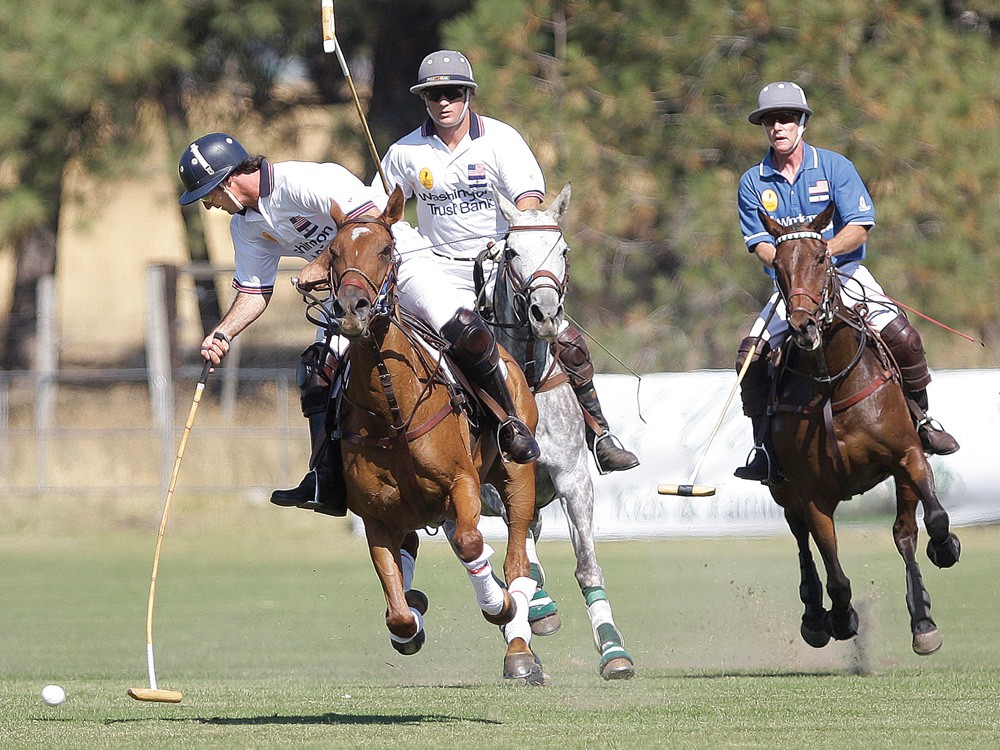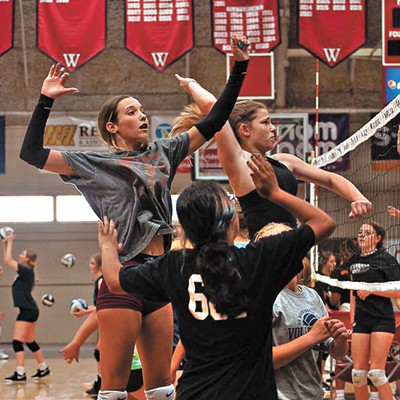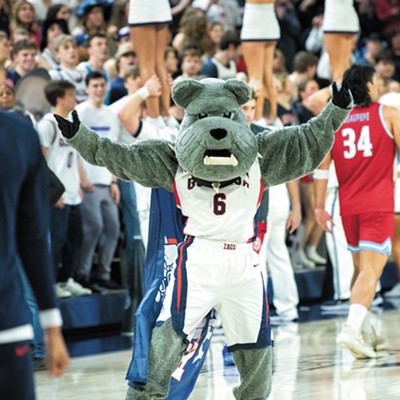Sitting in his late model Dodge Ram dually, parked on 600 yards of unbroken green turf on the West Plains, Frank Mortimer explains why there are no left-handed polo players.
His eyes dart back and forth, watching as eight men and women on horseback with helmets, leather shin guards and four-foot-long mallets sprint and cut after a small white ball. Players are not allowed to cross the path of the ball, Mortimer says. To do so is a foul.
In many other sports — basketball, hockey — fouls are called after egregious contact or collisions. In polo, fouls are called to prevent them.
There’s bumping and checking and jockeying and all the usual ferocity of sport, but “you’re on a 1,000-pound animal and you’re doing 35 miles per hour,” Mortimer says, so things get amplified.
Hence, everyone carries the mallet in their right hand so that, if two horses are sprinting headon at a ball, they’ll cross like jousters, rather than colliding like … Mortimer pops his hands together as if to say, “Game over.”
“The dumbest sport in the world is rock climbing,” Mortimer opines. “The most dangerous is polo.”
Not all polo takes place at 35 miles per hour, but Mortimer — who, at 71, trains and sells polo ponies — is presiding over a practice chukker of some of the area’s top talent last week, in advance of Sunday’s Cobra Polo Classic. Mortimer’s eyes move up and down the pitch, naming off players and their style of play, at a speed that’s difficult to keep up with.
A chukker is a period, and each lasts 7.5 minutes. When the polo is this fast, players change horses every chukker. In Spokane, polo is played four chukkers per game, meaning most players bring four different horses. At bigger clubs, especially in Florida, they’ll play six chukkers.
Frank’s son, Mike Mortimer, rides a large baycolored thoroughbred named Joey. On the other team are Pete and Eric Dix, scions of the family that built this place. Just before the end of the chukker, Mike streaks past the group on Joey, easily outpacing everyone to run down the ball.
“See that horse Mikey’s on?” Frank Mortimer asks. “Son of a bitch should be at Belmont.” When it comes time to sell Joey, Frank thinks he’ll fetch $20,000.
An air horn sounds, signaling the end of the chukker, and Mike’s sprint changes to a trot that bends its way off the field. Frank Mortimer cranks his dually to life, and drives back to help Mike switch horses.
In stark contrast to what lies around it, the land at the Peter Dix Polo Field is flat and lush and green. It’s an idyllic setting, buffered from the Sunset Highway by a corrugated steel mini storage unit that sits atop a plateau of fill dirt.
Mortimer keeps 13 horses here — six of his own and another seven he’s either training or tending for others. Suzy Dix, an area real estate agent, has 15, four of which are being taught polo for the first time.
Dix’s father, Peter, Sr., built this oasis in 1950 out of arid steppe — flattening high points with earth-movers and filling in a dry creek bed. It’s important for the horses, which can easily turn a leg on uneven footing. The footing here is especially sure, Dix says. “In 2,000 feet, there’s only 18 inches of elevation difference.”
Polo around here is a story of families who pass the tradition down through generations — whose lives revolve around the sport, the animals and the culture — and other horse people who find themselves brought into the fold.
Mortimer was brought into the fold in 1985, when he came from California to manage the club. “The Dix were the polo family,” Frank says, and they’ve stayed that way. Peter Dix died on these fields, at the age of 70. “Got up on his horse and had a heart attack,” Suzy says.
Dix has passed it on to her children. Her daughter, Catlin, recently sold two horses to the world’s top-ranked American player, Julio Arellano. This is a major coup. Players are rated as much on the horses they ride as on their skill with a mallet.
Along with her biological kids, Dix says she supplements a stable of hands who jokingly call her mom.
“This is my half-son,” Dix says, smiling, putting her arm around one of them. “I just don’t remember who the father is.”
At the stable after the chukker, Mike Mortimer is agitated, and Joey the thoroughbred is, too. The horse breathes in deep, snorting and huffing. A spider web of veins bulges from haunch and shoulder muscles that are swollen and twitching with exertion. Mike, meanwhile, is grousing about the Dix players.
“You foul them, they whine about it for weeks,” Mortimer says, “but they foul all the time!” “Shit,” Frank says, “Pete’s been fouling for 20 years.” In the same breath, Mortimer continues, “He goes 900 miles an hour — he’s a great [attacking player]. He scores almost every time he goes.”
The Mortimer and Dix families have stabled their horses in adjacent lots for over 20 years. Deep histories are a balm for momentary turmoil.
After practice, while she tends to a large hoof wound in a mare named Cayuse, Suzy Dix says that’s what separates polo from other sports. “When the tournament is over, there’s a big party,” she says, “and we all party together.”
There were players in town from all over the West, and as far away as Argentina, to play in a memorial tournament in honor of her father. “Half of my enemies are staying at my house right now.”
With Cayuse’s hoof cleaned, bandaged and duct-taped, Dix checks in at the stall next door, where she keeps a miniature horse named Flame. Flame is tiny, and a little comical. She’s not a polo pony. “Her job this year is to keep Cayuse company,” Dix says, while she recovers.
Cayuse
wouldn’t do well without Flame. Polo horses are herd animals, Dix says.
“They need to always have their buddies.” The same is true, it seems,
of polo people.
The Cobra Polo Classic • Sunday, Sept. 11 at noon • Peter Dix Polo Field, 7724 W. Sunset Hwy., Airway Heights (behind ABC Mini Storage) • $200 • 624-0500 • spokanepoloclassic.com






















